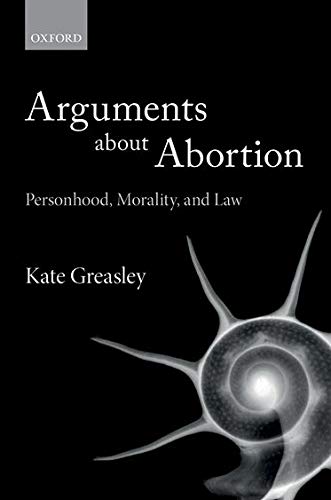Rev. David Breeden: A Philosophy of Radical Humanist Welcome
 A Philosophy of Radical Humanist Welcome
A Philosophy of Radical Humanist Welcome- to be human,
- to be human in the fullness of human potential,
- and to be human in a community of care.

 A Philosophy of Radical Humanist Welcome
A Philosophy of Radical Humanist Welcome How do Unitarian Universalists and other religious and secular progressives frame a response to the demise of Roe v. Wade? Kate Greasley’s book Arguments about Abortion: Personhood, Morality, and Law (2017) offers a thorough defense of the pro-choice position. Written before the Supreme Court scuttled Roe, Greasley’s justification for abortion rights is newly useful. The work proffers important tools both to thoughtful readers interested in secular moral reasoning as well as pro- choice activists who wish to make their case. Read more about Arguing Abortion in a Post-Roe America »
How do Unitarian Universalists and other religious and secular progressives frame a response to the demise of Roe v. Wade? Kate Greasley’s book Arguments about Abortion: Personhood, Morality, and Law (2017) offers a thorough defense of the pro-choice position. Written before the Supreme Court scuttled Roe, Greasley’s justification for abortion rights is newly useful. The work proffers important tools both to thoughtful readers interested in secular moral reasoning as well as pro- choice activists who wish to make their case. Read more about Arguing Abortion in a Post-Roe America »
Learn more about Alison Miller at the Alison Miller for UUA President website and Facebook page.
Question 1. How do you think UU congregations can reach those who identify as “nones,” including nones who wouldn’t identify themselves as spiritual? One idea the UU Humanist Association has launched is a “Freethinker Friendly” designation, specifying that individual UU congregations welcome those who identify themselves outside of traditional religions. How would you imagine that working? What other ideas do you have that tie UUism’s humanist roots with the growing number of people who identify as secular in America? Read more about Alison Miller’s Responses to Questions from the UU Humanist Association »
I write this four days after the March for Science, and three days after Yameen Rasheed, a human rights focused secular blogger in the Maldives, was murdered.
What to make of all this.
I happily participated in the March for Science with my local Sunday Assembly community, and was heartened to see several, well worn, yellow "Standing on the Side of Love" t-shirts throughout the crowd. The East Bay Atheists, the Kol Hadash Humanistic Jewish Community, the Center for Inquiry, and the Bay Area Humanists were also proud and present, as was a big contingent from San Francisco's Grace Cathedral - with big "Grace for All" signs.
While "listening" to speakers before the March (Can you ever really hear them?), one of our Sunday Assembly members recounted a story from the novel Catch 22- a bit macabre - involving the mix up of a catheter and an IV. "It's crazy!" he recounted, "and when I see what's going on, I just want to shout "This is crazy!" Read more about Keep the Resilience »
[Editor's Note: If you are interested in the topic of Effective Altruism, there is a Coursera course by that name being taught right now by the well-known philosopher Peter Singer of Princeton University! Coursera courses are free and there is an entire week devoted to the Giving Game including an opportunity to play online as part of the course.]
“Thank you. I never thought of applying the scientific method to charity. My giving will never be the same.”
I was delighted to hear this feedback from a participant in a workshop I ran for my local Unitarian Universalist Humanist group at the First Unitarian Universalist Church of Columbus in late July 2016. The workshop, called a Giving Game, aimed to help facilitate rational thinking about our positive impact on the world through applying the scientific method to charity. Read more about Applying The Scientific Method To Charity »
Oooh, fights. We either run from them, run toward them, or pretend they’re not there (haven’t we all just smiled while passing the sweet potatoes at Thanksgiving?). And many of we Unitarian Universalists have been thinking a lot about fights, since hearing the Rev. Nancy McDonald Ladd’s sermon on “Fake Fights” at this year’s General Assembly.
As blogger (and fellow UU Humanist Association Board member) Adam Gonnerman noted in his great post about the sermon, some humanists have been nervous that Rev. Ladd was pointing to the ongoing humanist-theist conversation within Unitarian Universalism as one of those fake fights. Those folks are likely remembering Ladd’s mention of how we are “still fighting about who’s a humanist and who’s a theist--as though those two terms are mutually exclusive in the first place.” Read more about Fake Fights »
Last summer, there was terrible violence in South Carolina. 9 individuals, 9 black Americans, were shot dead by a deranged terrorist in their church. There was outcry. Preachers and leaders promised change - or, at least, held up the communities of concern that formed out of pain.
Now, a year later, across the country there are communities of concern that have gathered in response to pain. This time, 49 individuals, LGBT Americans, many Latino, were shot dead by a deranged terrorist in an LGBT Club. 49 murdered, 53 wounded.
Just a few days ago, here in Oakland, a young girl was shot dead after leaving a funeral.
What do we do in response to these murders? What does our movement, religious and secular, do in response?
Some people, when pain happens, need to be alone, or with one person.
When I heard the news, I craved community. I wanted to be around others, I wanted to see and contribute and be with other people trying to do something- even if initially it was only a witness. Read more about Not Just Mourners »
The UUA presidential race is just getting underway. UU Humanists would, of course, like the next UUA president to understand and support humanism in the association, help us attract humanists to Unitarian Universalism, and to increase the influence of our progressive philosophy in the culture at large. Our friends at the Humanist Group of the Unitarian Church in Summit, NJ have suggested that we solicit questions from our members and local groups in order to “crowdsource” the task of coming up with the best questions to pose to the candidates. This would be a great topic for a humanist group meeting at your congregation or on-line if you do not have a local group.
Read more about Questions for the UUA Presidential Candidates »
By Daniel Braga-Lawlor
Sunday Assembly is a negotiated community, a network of secular congregations across the world, primarily in Western Europe, North America, South Africa, and Australia. The dominant, though occasionally debated, ethos in Sunday Assembly is faith-neutral secularism ("Let's celebrate the one life we have! We don't do deity, but we won't tell you you're wrong if you do!").
Sunday Assemblies organize a monthly celebration, have no official text, no clergy (we rotate hosts for our Sunday celebrations), and each community has great latitude in selecting its speakers, songs and readings, as well as defining the local service work. The songs we sing are not hymns, but come from across pop music - in Northern California, we've sung "Superstition," by Stevie Wonder, "Lean On Me," by Bill Whithers, "Both Sides Now" by Joni Mitchell, "Time after Time," by Cyndi Lauper, and many others. We operate from the premise that knowledge from across the fields (arts, sciences, economics, ethics) offers insights, and that all people, as believers and non- believers alike, matter. Read more about Humanists Doing Good »
The following is the question I asked at the “Meet the Muslims” panel discussion that was sponsored by our church. My aim was to see how they would answer the question but also to raise their consciousness about the presence of a substantial constituency of non believers in the general population and to face them with the implications of their scripture for that constituency.
A QUESTION FOR THE RELIGION OF PEACE
My name is David Miller and I am Minister Emeritus of the Unitarian Universalist Church of Worcester. We are sponsoring this panel discussion in the spirit of the verse in Quran 49:13 that says “…we…made you into nations and tribes, that ye may know each other (not that ye may despise each other).” (Abdullah Yussuf Ali translation)
This winter I have been re-reading the Holy Quran to refresh my memory about its contents. Read more about A Question for the Religion of Peace »